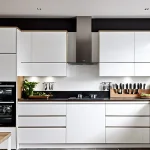Transforming Kitchen Functionality with Smart Appliances
Smart kitchen technology in the UK is rapidly evolving, shaping modern kitchens into hubs of efficiency and convenience. A major driver behind this kitchen innovation is the integration of appliances that communicate seamlessly, creating an ecosystem tailored to the user’s lifestyle. This approach to kitchen design moves beyond standalone devices, emphasizing interconnectedness to streamline everyday tasks.
Integrated appliances are central to this transformation. By combining refrigeration, cooking, and cleaning functionalities into unified systems, users experience enhanced control and flexibility. For instance, smart ovens that sync with recipe apps or refrigerators that monitor inventory levels exemplify how kitchen innovation directly improves usability. Such integrated appliances reduce manual effort while enabling precision in cooking and energy management.
Topic to read : Exploring the uk market’s reaction to the surge in open-plan kitchen demand
Consumer adoption in the UK reflects a clear preference for these smart solutions. Homeowners increasingly select integrated kitchen setups for their ability to simplify meal preparation and optimize space. With smart kitchen technology UK brands prioritizing user-friendly interfaces and reliable connectivity, the market sees steady growth. This trend signals a move towards kitchens designed not just for food preparation but also for intelligent interaction.
In summary, the integration of smart appliances is pivotal in advancing kitchen innovation. It elevates functionality and responds to modern demands, making smart kitchen technology UK consumers eagerly embrace these changes.
Have you seen this : Revolutionizing kitchen dynamics in the uk: the impact of smart appliances
Key Benefits of Smart Appliance Integration
Smart appliance integration offers significant advantages that enhance the modern kitchen experience. One of the most notable benefits is improved efficiency and time-saving functionality. Connected devices communicate seamlessly to automate routine tasks, allowing users to focus on other activities. For example, a smart oven can preheat remotely, while a smart refrigerator monitors inventory and suggests recipes, streamlining meal preparation.
Another crucial advantage is the enhanced convenience and connectivity provided by an energy-saving kitchen. Smart appliances can be controlled via smartphone apps or voice commands, giving users greater flexibility and ease. This connectivity not only simplifies cooking but also helps coordinate multiple kitchen devices to work in harmony, making daily tasks more manageable.
Furthermore, the integration of smart appliances contributes significantly to energy-saving features, promoting sustainable living. These devices optimize power usage by adjusting settings based on real-time data, such as turning off when not in use or operating during off-peak hours. Such features reduce electricity consumption, lowering utility bills without compromising performance.
By adopting smart appliance integration, homeowners benefit from a modern kitchen upgrade that blends efficiency, convenience, and sustainability into a cohesive system. This combination not only modernizes kitchen operations but also aligns with growing environmental awareness and lifestyle demands.
Smart Appliances Shaping UK Kitchens
Smart ovens, connected refrigerators, voice-controlled appliances, and kitchen automation are revolutionizing how people in the UK interact with their kitchens. Among these, smart ovens stand out for their ability to adjust cooking times and temperatures automatically, ensuring perfectly cooked meals every time without constant supervision. Connected refrigerators go beyond simple cooling; they monitor food freshness, suggest recipes based on available ingredients, and even create shopping lists.
Voice-controlled appliances provide hands-free convenience, allowing users to operate ovens, microwaves, and even dishwashers simply by speaking commands. This integration supports multitasking and enhances kitchen efficiency. Kitchen automation combines these elements into cohesive systems that optimize energy use and streamline meal preparation, reflecting the broader trend toward smart homes.
Emerging innovations include appliances with AI-driven cooking guidance and predictive maintenance alerts that notify users before a fault occurs. These advancements highlight the potential for smart kitchen devices to transform cooking from a chore into an engaging, effortless experience.
Real-life Applications and Case Studies
Exploring UK homeowner experiences reveals valuable insights into the successful integration of smart appliances within real kitchens. Many have reported enhanced convenience by adopting smart kitchen systems tailored to their lifestyle. For instance, integrated kitchen design that merges traditional cabinetry with connected technology has become a popular approach, balancing aesthetics with functionality.
However, real-life applications expose practical challenges such as compatibility issues between devices and the need for reliable Wi-Fi to ensure seamless operation. Solutions often involve choosing appliances from interoperable brands or using centralized smart hubs to unify control, greatly simplifying user interaction.
When upgrading to a smart kitchen, design considerations must prioritize not only the placement of appliances but also ergonomic factors to optimize daily use. UK homeowners frequently emphasize the importance of future-proofing their kitchens by selecting scalable systems that accommodate new technologies as they emerge. This strategic planning enhances long-term satisfaction and system efficiency.
Expert Insights and Future Trends
The landscape of kitchen technology trends in the UK is rapidly evolving, driven by advances in home automation and increasing consumer demand for convenience and efficiency. Home automation experts emphasize that the future of smart kitchens will focus on seamless integration, allowing appliances and devices to communicate effortlessly. This interconnectedness aims to simplify daily tasks, enhance energy efficiency, and provide intuitive control over kitchen environments.
Anticipated advancements include more sophisticated sensors and AI-driven systems that personalize cooking recommendations and optimize appliance usage. For instance, smart ovens will soon adjust cooking times based on real-time feedback, while refrigerators may monitor food freshness and automatically suggest shopping lists. These innovations exemplify how the future of smart kitchens relies on smarter, adaptive technology that learns from users’ habits.
Homeowners considering smart kitchen upgrades should prioritize compatibility and ease of use. Consulting with home automation experts can help identify interoperable systems that reduce complexity and future-proof the kitchen. Additionally, investing in modular technologies allows for incremental upgrades without a complete overhaul. This strategic approach ensures that homeowners enjoy the benefits of cutting-edge technology while maintaining flexibility in adapting to emerging kitchen technology trends.

